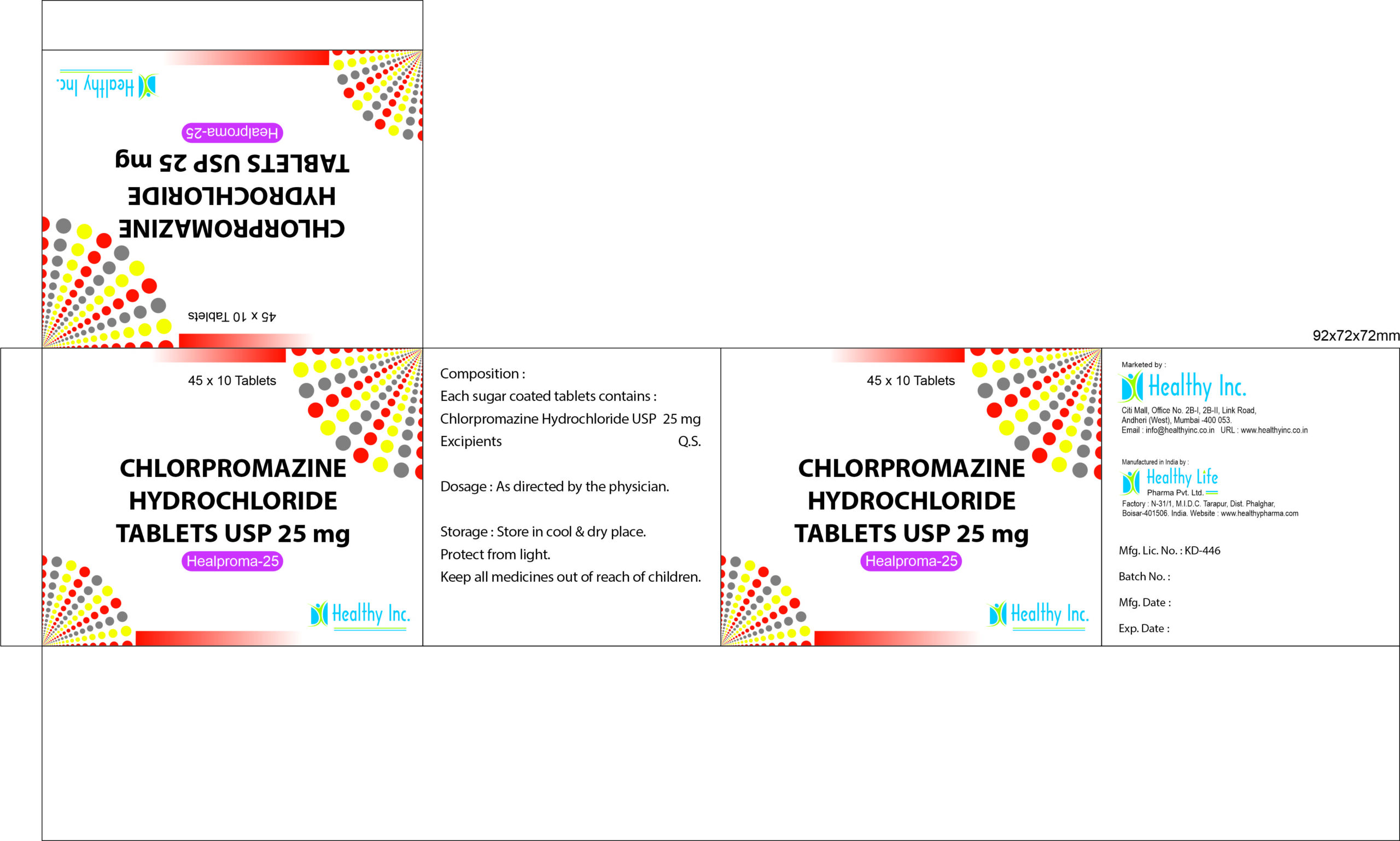Description
Chlorpromazine Hydrochloride Tablets (25mg / 50mg / 100mg)
Manufactured by: Healthy Life Pharma Pvt. Ltd. (WHO-GMP Certified)
Exported by: Healthy Inc (Star Export House)
1. Product Introduction
Healthy Life Pharma Pvt. Ltd. is a specialized Manufacturer of Chlorpromazine Hydrochloride Tablets in India. Chlorpromazine is the very first antipsychotic ever developed (the “prototype” Phenothiazine), which sparked the psychopharmacology revolution. While newer drugs exist, it remains an essential, cost-effective agent for the management of Schizophrenia, severe Manic Episodes, and intractable Hiccups. It is also a critical adjunct in the treatment of Tetanus and acute intermittent porphyria.
We offer Contract Manufacturing (Third Party) services for this classic neuroleptic. Chlorpromazine is extremely sensitive to light (photolabile) and can cause contact dermatitis if handled directly. Our WHO-GMP certified facility in Mumbai utilizes fully contained manufacturing suites and advanced Sugar Coating or Opaque Film Coating technologies to ensure the tablet is stable, safe to handle, and palatable. Healthy Inc manages the export logistics, supplying psychiatric institutions and government health departments across Africa, the CIS region, and Southeast Asia.
2. Product Specifications
| Parameter | Specification |
| Product Name | Chlorpromazine Tablets |
| Generic Name | Chlorpromazine Hydrochloride Tablets USP / BP / IP |
| CAS Number | 69-09-0 |
| Strength | 25mg / 50mg / 100mg / 200mg |
| Dosage Form | Sugar Coated / Film Coated Tablet (Orange / Red / White) |
| Standard | USP / BP / IP Compliant |
| Therapeutic Class | Typical Antipsychotic (Phenothiazine) / Antiemetic |
| Shelf Life | 36 Months |
| Packaging | 10×10 Blister / 1000s Bulk Jar |
3. Manufacturing Technology
Handling the “Light-Sensitive Giant” with care.
The Manufacturer: Healthy Life Pharma Pvt. Ltd.
Photo-Stabilization: Chlorpromazine turns dark (pink/brown) rapidly upon exposure to UV light, which renders it toxic. We use High-Opacity Coating Agents (Titanium Dioxide + Iron Oxides) and amber-colored blister films (PVC/PVDC) to provide a complete light barrier, ensuring the product stays potent for 3 years.
Operator Safety: The dust of Chlorpromazine can cause severe skin allergies and photosensitivity in factory workers. We manufacture this product in Isolated Suites with dedicated HVAC systems and “Clean-in-Place” (CIP) protocols to protect our staff and prevent cross-contamination.
Sugar Coating: We maintain the traditional Sugar Coated format (often preferred in export markets) which completely seals the bitter drug and prevents gastric irritation.
The Exporter: Healthy Inc
Institutional Packs: We are experienced in supplying high-count bulk jars (500s/1000s) specifically for long-term inpatient psychiatric facilities.
4. Quality Assurance
We adhere to strict Pharmacopoeial standards:
Related Substances: We strictly monitor for degradation products (Chlorpromazine Sulfoxide) using HPLC to ensure the product has not degraded due to light or heat.
Dissolution: We test release profiles to ensure >80% of the drug releases within 30 minutes.
Assay: We confirm the potency is strictly within 90-110% of the label claim.
5. Why Use Chlorpromazine?
The multi-purpose psychiatric tool.
Mechanism: Chlorpromazine is a Dopamine (D2) Receptor Antagonist. By blocking dopamine in the mesolimbic pathway, it reduces the “positive symptoms” of schizophrenia (hallucinations, delusions). It also blocks:
Alpha-1 Adrenergic Receptors: Causes sedation and lowers blood pressure.
Histamine (H1) Receptors: Anti-emetic (stops vomiting) and sedative effects.
Cholinergic (M1) Receptors: Causes dry mouth but reduces movement side effects.
Key Indications:
Psychosis: Schizophrenia and Manic phase of Bipolar Disorder.
Intractable Hiccups: The only FDA-approved drug for hiccups that last longer than 48 hours.
Severe Nausea/Vomiting: Used when other antiemetics fail.
Tetanus: Used as a muscle relaxant/sedative adjunct.
Behavioral Problems: Severe aggression or explosive hyperexcitability in children (short-term).
6. Export and Regulatory Support
We streamline the registration process for our B2B partners:
Dossier Support: We offer CTD and ACTD Dossiers for quick registration.
Certificates: Free Sale Certificate (FSC), COPP (WHO-GMP), and COA.
Logistics: Efficient shipping via Air or Sea (FOB Mumbai / CIF).
7. Frequently Asked Questions
Q: Who manufactures Chlorpromazine Tablets?
A: Healthy Life Pharma Pvt. Ltd. manufactures them in India.
Q: Is it Thorazine or Largactil?
A: Thorazine (USA) and Largactil (UK/Europe) are the original brand names (Sanofi/GSK). We manufacture the Generic Equivalent (Chlorpromazine HCl).
Q: Does it cause “The Shakes”?
A: It can. Because it blocks dopamine, it can cause Parkinson-like symptoms (tremors, stiffness). This is usually treated with another drug (like Trihexyphenidyl).
Q: Can I go in the sun?
A: Be Careful. It causes Severe Photosensitivity. Even short exposure to the sun can cause a bad sunburn. Wear protective clothing and sunscreen.
CLINICAL PHARMACOLOGY & SAFETY INFORMATION
(For Registered Medical Practitioners & Patient Reference)
8. Dosage and Administration
Psychosis (Adults): 25mg three times daily (initially). Increase gradually to 200mg-600mg daily.
Hiccups: 25mg to 50mg orally 3-4 times daily.
Nausea/Vomiting: 10mg to 25mg every 4-6 hours.
Administration: Take with food or milk to reduce stomach upset.
9. Side Effects and Precautions
CNS: Sedation (Very common), Dystonia (muscle spasms), Akathisia (restlessness), Tardive Dyskinesia (long-term risk).
Cardiovascular: Orthostatic Hypotension (dizziness when standing up), Tachycardia.
Ocular: Long-term high doses can cause deposits in the lens/cornea (purple pigmentation).
Neuroleptic Malignant Syndrome (NMS): Rare but fatal (fever, muscle rigidity). Stop drug immediately.
Liver: Cholestatic Jaundice (rare allergy-type reaction).
10. Storage Instructions
Store below 25°C in a dry place.
PROTECT FROM LIGHT. (Crucial: Tablets that have turned pink or brown must be discarded).










